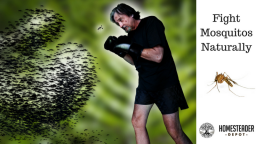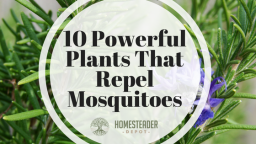From the early 90’s encephalitis scares to today’s news of Zika and West Nile virus, people are looking for as many options for mosquito repellent as possible. And, thanks to the chemical scares that occurred long before, effective organic options are highly desired.
Fortunately, there are a number of options to make spring and summer night much more comfortable and much less life-threatening.
From Lemongrass to Citronella Oil
One of the most well-known mosquito repellent plants is lemongrass. Lemongrass is the plant citronella oil is extracted from. Use as a natural spray, burn in candles or put in oil burners to create a “safe area” outdoors.
Basil
Yep, the same stuff you use to cook with and make pesto. Adding this to your outdoor garden or in pots on your patio will do more than keep you cooking with fresh herbs. The fantastic smell it gives off will also ward off several types of insects including mosquitos.
Catnip
Not just for making your cat go gaga, Catnip is also known as one of the powerful natural insect repellents. It is actually 10 times stronger than DEET. Whether you use it fresh by planting it in your garden or buying an essential oil version, the aroma will repel mosquitos (and your cats will LOVE you).
Lavender
Lavender’s aroma is popular for its calming effect on us, but did you know its also a great mosquito repellent? Fortunately, because of its popularity as a stress reliever, it’s very easy to find. From candles and incense to essential oil to wear or disperse through a burner, you can de-stress and be bug-free all at the same time.
Marigolds
Another option to add to your garden, Marigolds are not just colorful, they are a natural mosquito repellent.
Cedar
This natural option works on more than just moths. Used to make some repellent sprays on the market, you can make your own with essential oils. The smell is not only repellent to mosquitos but destructive for them as well.
Chamomile
Keep that used tea bag instead of tossing it. Since most tea bags can be used more than once, just make one cup for you and one cup to cool and add to a spray bottle for a fresh smelling repellent spray.
Chrysanthemums
These beauties are known for their insecticide compounds. Chrysanthemums contain Pyrethrum. This compound actually attacks the nervous system and disrupts female mosquitoes. They are also a great air purifier so feel free to plant them inside and out to get their full benefits.
Horsemint
Several members of the mint family are known to be effective repellents. In the case of horsemint (aka bee balm) simply crush them to release the essential oils and rub onto your skin.
When planted outdoors, it will also attract bees and hummingbirds to your garden.
Related Article: “Natural Relief for Insect Bites”
White Sage
This particular plant will keep blooming all summer making consistent repellent for mosquitos and several other animals, including deer. Just keep an eye on them, they can be invasive if left alone.
Lemon Verbena
As the name suggests, this herb has a very lemony aroma that is ever stronger when crushed.
You Don’t Have to be Afraid to go Outdoors
Creating a mosquito barrier around your home can go a long way to making your backyard activities much more comfortable and safer to your health. Thanks to the options we’ve discussed above, you have a number of ways to accomplish building a barrier without having to rely on harsh chemicals that can pollute the environment.


